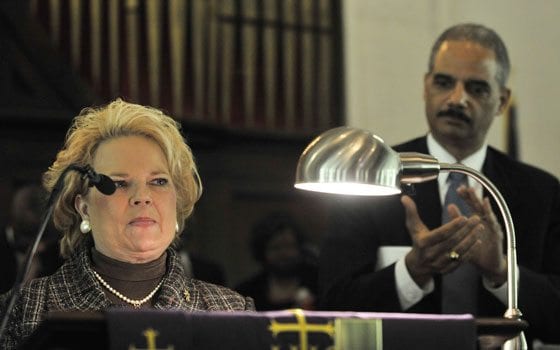
SELMA, Ala. — The nation’s first black attorney general and Gov. George C. Wallace’s daughter celebrated the Selma-to-Montgomery voting rights march Sunday — 44 years after state troopers from her father’s administration beat marchers as they started the landmark journey.
Peggy Wallace Kennedy introduced Attorney General Eric Holder at a historic Selma church filled to overflowing.
“It’s reconciliation and redemption,” Wallace’s daughter said.
Selma’s annual Bridge Crossing Jubilee, commemorating the 1965 voting rights march, brought together civil rights leaders like the Revs. Jesse Jackson, Al Sharpton and Joseph Lowery in addition to the attorney general and several members of Congress, including U.S. Rep. John Lewis, D-Ga., who was beaten in the original Selma march. More than 1,000 people took part in recreating the march Sunday.
Holder and Kennedy embraced at Brown Chapel A.M.E. Church, where marchers organized on March 7, 1965, to begin their 50-mile trek to Montgomery.
A few blocks into the march, they were beaten by state troopers on Selma’s Edmund Pettus Bridge — an event that became known as “Bloody Sunday.”
The march to Montgomery was later completed under federal protection, with Martin Luther King Jr. leading it. It prompted passage of the Voting Rights Act, which opened Southern polling places to blacks and ended all-white government.
“I am a beneficiary of Selma,” Holder said.
Wallace’s daughter endorsed Barack Obama for president last fall, but she and Holder had never met until Sunday. The ties between them, however, go back decades.
Her father stood in the schoolhouse door at the University of Alabama in 1963 in an unsuccessful attempt to keep Holder’s future sister-in-law, Vivian Malone Jones, from integrating the university.
“I so wish Vivian had lived to see this moment,” Holder said after hugging Wallace’s daughter.
Kennedy said that as a child watching the Selma-to-Montgomery march, “I knew their cause was just.” But she said she never spoke out politically until she endorsed Obama, who appointed Holder.
Selma’s black mayor said Obama’s election was the fulfillment of marchers’ dreams.
“What happened in Selma 44 years ago set in motion events that led to the election of our 44th president, Barack Obama,” Mayor George Evans said.
Holder said no one dreamed on “Bloody Sunday” that George Wallace would later apologize for his segregationist views or that his daughter would one day support a black man for president.
But, he added, it’s no time to rest.
In an earlier speech at Wallace Community College, Holder said it’s vital to protect a key provision of the Voting Rights Act. The U.S. Supreme Court agreed in January to review a lower court ruling that upheld a portion of the law requiring all or part of 16 states, including Alabama, to get federal approval before implementing any changes in the way elections are held.
“We must commit ourselves to continuing to defend the Voting Rights Act, which is under attack,” Holder said.
(Associated Press)






